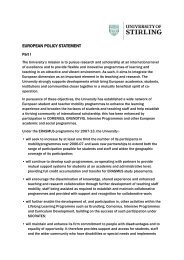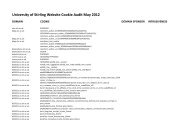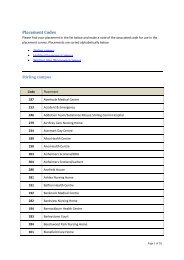Health First: An evidence-based alcohol strategy for the UK
Health First: An evidence-based alcohol strategy for the UK
Health First: An evidence-based alcohol strategy for the UK
Create successful ePaper yourself
Turn your PDF publications into a flip-book with our unique Google optimized e-Paper software.
<strong>Health</strong> <strong>First</strong>: an <strong>evidence</strong>-<strong>based</strong> <strong>alcohol</strong> <strong>strategy</strong> <strong>for</strong> <strong>the</strong> <strong>UK</strong><br />
Interventions <strong>for</strong> <strong>the</strong> spectrum<br />
of <strong>alcohol</strong> problems<br />
Alcohol can affect personal health and wellbeing<br />
in numerous ways ranging from anxiety and<br />
depression to severe and potentially life-threatening<br />
conditions such as liver disease, cardiovascular disease,<br />
cancer and neurological disease. It is not unusual<br />
<strong>for</strong> <strong>alcohol</strong> to cause multiple problems in <strong>the</strong> same<br />
individual, affecting both mental health and physical<br />
health.<br />
The emphasis of this report is on preventing <strong>the</strong> harm<br />
from <strong>alcohol</strong> by intervening as early as possible in <strong>the</strong><br />
chain of causes and effects that starts with cheap,<br />
attractive products and ends with chronic illness and<br />
premature deaths. <strong>Health</strong> and social care professionals<br />
have a key role to play in <strong>the</strong> prevention of <strong>alcohol</strong><br />
misuse through early identification and brief advice <strong>for</strong><br />
hazardous and harmful drinkers and, where necessary,<br />
prompt referral to specialist <strong>alcohol</strong> services <strong>for</strong><br />
people with <strong>alcohol</strong> dependence. Such interventions<br />
are supported by a solid <strong>evidence</strong> base and are<br />
cost effective. However, when hospital treatment is<br />
necessary, <strong>the</strong> right team of staff needs to be in place<br />
to provide appropriate and effective support.<br />
Early identification and brief<br />
advice<br />
At a population level, most <strong>alcohol</strong>-related problems<br />
are attributable to hazardous and harmful drinking<br />
ra<strong>the</strong>r than to <strong>alcohol</strong> dependence 1 . Yet few people<br />
who drink more than <strong>the</strong> recommended low risk<br />
levels of <strong>alcohol</strong> consumption seek professional help<br />
<strong>for</strong> <strong>the</strong>ir drinking. Often people are unaware of <strong>the</strong><br />
long-term dangers to <strong>the</strong>ir health of <strong>the</strong>ir drinking<br />
and, when <strong>the</strong>y develop <strong>alcohol</strong> dependence, <strong>the</strong>y<br />
may take a long time to seek help. However, many will<br />
still encounter doctors or o<strong>the</strong>r health and social care<br />
professionals ei<strong>the</strong>r because of acute <strong>alcohol</strong>-related<br />
problems or <strong>for</strong> reasons unrelated to <strong>the</strong>ir <strong>alcohol</strong><br />
consumption. Such encounters provide an opportunity<br />
<strong>for</strong> professionals to identify risky drinking and respond<br />
appropriately.<br />
The time available within any professional-client<br />
encounter <strong>for</strong> discussion of lifestyle issues such as<br />
drinking is always limited. None<strong>the</strong>less <strong>the</strong>re is strong<br />
<strong>evidence</strong> that opportunistic early identification and<br />
brief advice provided by general practitioners and<br />
o<strong>the</strong>r health professionals is effective in reducing<br />
<strong>alcohol</strong> consumption and related problems 2,3 . Such<br />
interventions have been designed specifically <strong>for</strong><br />
professionals working in busy healthcare settings who<br />
do not have specialist training in <strong>alcohol</strong> disorders.<br />
Early identification involves <strong>the</strong> administration<br />
of a short questionnaire about current drinking<br />
behaviour. This is followed by advice and in<strong>for</strong>mation,<br />
appropriate to <strong>the</strong> client and <strong>the</strong> context. This does<br />
not require extensive training to deliver effectively.<br />
Patients who do not respond to brief advice or who<br />
experience <strong>alcohol</strong> dependence should be referred to<br />
<strong>alcohol</strong> specialists <strong>for</strong> more intensive interventions.<br />
Given both <strong>the</strong> size of <strong>the</strong> population who drink in a<br />
manner that is potentially or actually harmful to <strong>the</strong>ir<br />
health (in England, a quarter of <strong>the</strong> population) and<br />
<strong>the</strong> effectiveness of <strong>the</strong> intervention, <strong>the</strong> wider use of<br />
such brief interventions would significantly reduce <strong>the</strong><br />
overall burden of disease caused by drinking.<br />
Early identification and brief advice should be delivered<br />
and supported in both primary and secondary care<br />
to achieve maximum health gain. The potential cost<br />
savings to <strong>the</strong> NHS and wider society from widespread<br />
implementation are considerable.<br />
Most of <strong>the</strong> work on brief interventions to date has<br />
been in primary care but <strong>the</strong>re is increasing <strong>evidence</strong><br />
of effectiveness in o<strong>the</strong>r settings including emergency<br />
care, pharmacies, schools, social care and <strong>the</strong> criminal<br />
justice system. NICE has recommended widespread<br />
implementation of early identification and brief<br />
advice in a range of health and social care settings,<br />
given <strong>the</strong> strength of <strong>the</strong> international <strong>evidence</strong> of its<br />
effectiveness 4 . The population living with, or at risk<br />
of, mental health problems is a particularly important<br />
target <strong>for</strong> <strong>the</strong>se interventions.<br />
Recommendation<br />
All health and social care professionals<br />
should be trained to routinely provide<br />
early identification and brief <strong>alcohol</strong><br />
advice to <strong>the</strong>ir clients.<br />
Treatment <strong>for</strong> <strong>alcohol</strong><br />
dependence<br />
People with <strong>alcohol</strong> dependence usually require<br />
more intensive interventions delivered by specialist<br />
<strong>alcohol</strong> services. <strong>Health</strong> and social care practitioners<br />
also have an important role in <strong>the</strong> early identification<br />
33
















